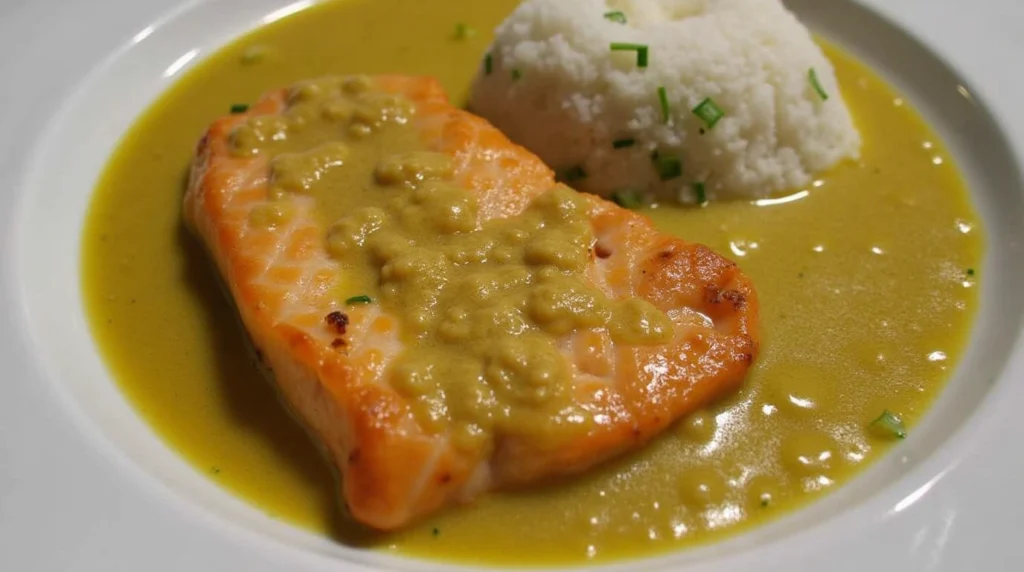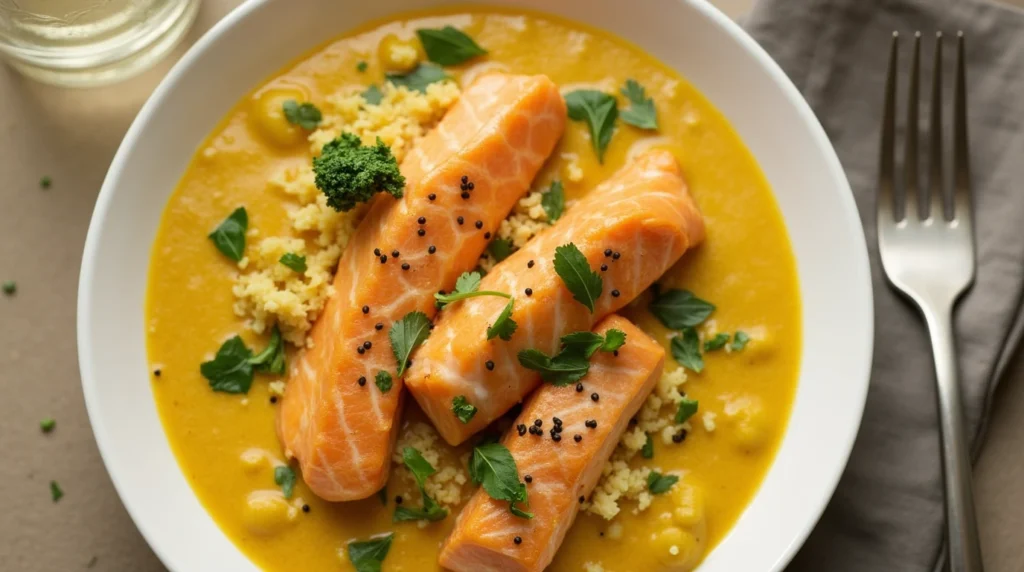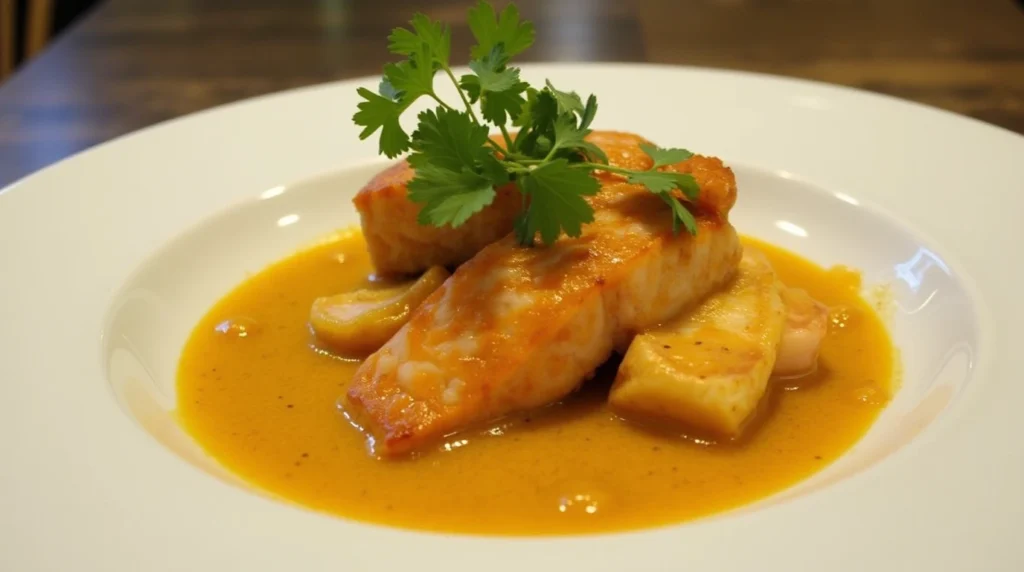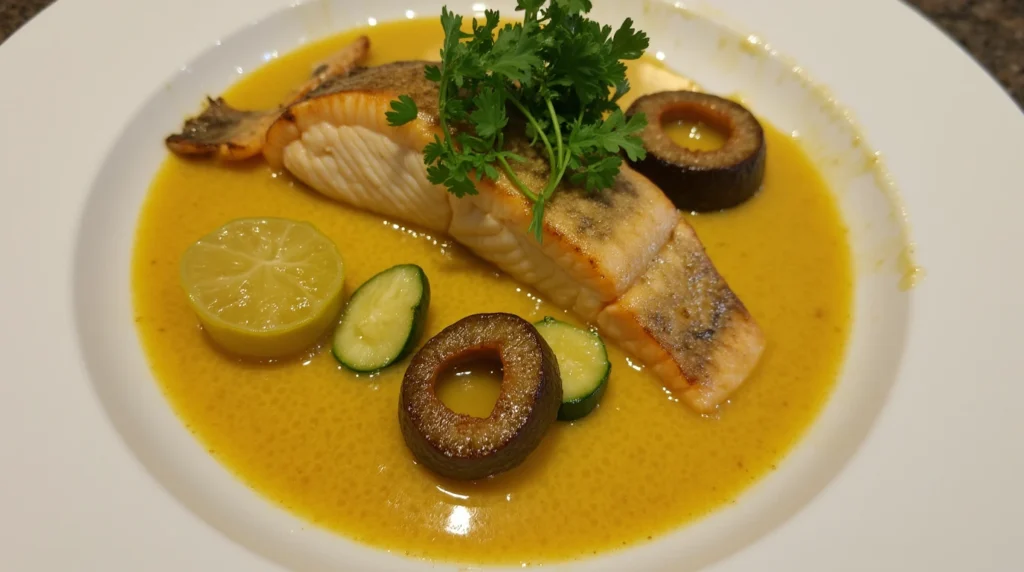Introduction

Have you ever wondered why some salmon dishes leave your taste buds dancing while others fall flat? The secret often lies in the spices. Whether you’re crafting a creamy salmon curry , grilling up a fillet, or baking it to perfection, the right seasonings can transform an ordinary dish into something extraordinary.
Let me share a personal story—my first attempt at cooking salmon was lackluster. It wasn’t until I discovered the magic of turmeric and cumin that my meals became memorable. Are you using the best spices for your salmon recipes? If not, this guide will show you how to take your cooking to the next level. Let’s dive in!
Why Spices Matter When Cooking Salmon
Before we get into the specifics, let’s explore why spices play such a crucial role in enhancing salmon:
- Versatility : Salmon is one of the most adaptable proteins out there. From light citrus flavors to bold curry pastes, it pairs beautifully with almost anything.
- Health Benefits : Many spices don’t just add flavor—they also bring health benefits like anti-inflammatory properties and immune support.
- Cultural Exploration : Experimenting with spices allows you to travel the world through your kitchen, whether it’s Indian garam masala or Thai red curry paste.
Are you ready to unlock the full potential of your salmon dishes?
Popular Spices That Complement Salmon
Here are four must-have spices that every salmon lover should keep on hand:
Turmeric – Nature’s Golden Wonder
Turmeric isn’t just a vibrant yellow spice; it’s packed with antioxidants and anti-inflammatory compounds. Here’s why it works so well with salmon:
- Adds a warm, earthy note.
- Enhances the natural richness of salmon.
- Boosts overall health thanks to curcumin, its active compound.
Cumin – Earthy Warmth
This aromatic spice brings depth and complexity to any dish. Try pairing it with lemon juice for a refreshing twist.
- Perfect for marinades and dry rubs.
- Balances fatty fish like salmon beautifully.
Paprika – Smoky Sweetness
Whether smoked or regular, paprika adds layers of flavor without overpowering the delicate taste of salmon.
- Ideal for grilled or roasted preparations.
- Available in sweet, hot, and smoked varieties.
Ginger – Zesty Freshness
Fresh ginger complements salmon by cutting through its richness with a burst of citrus-like zing.
- Use grated ginger in marinades for extra punch.
- Combines wonderfully with soy sauce and garlic.
Regional Spice Blends for Salmon
Different cultures have perfected their own ways of seasoning salmon. Here are four regional blends worth trying:
Indian Garam Masala – A Warm Embrace
Garam masala is a blend of ground spices commonly used in Indian cuisine. Its warmth makes it perfect for salmon curry recipes.
- Contains cardamom, cinnamon, cloves, and more.
- Works as both a marinade and finishing touch.
| Recipe Ingredients | Quantity |
|---|---|
| Salmon Fillets | 4 pieces |
| Garam Masala | 1 tsp |
| Coconut Milk | 1 cup |
| Tomatoes | 2 medium |
Thai Curry Pastes – Bold Heat and Aroma
Thai curry pastes infuse salmon with intense flavors. Choose from red, green, or yellow depending on your preference.
- Red paste offers heat, while green brings brightness.
- Combine with coconut milk for a creamy base.
Mediterranean Herbs – Light and Fragrant
For those who prefer lighter seasoning, Mediterranean herbs like rosemary, thyme, and oregano shine.
- Sprinkle fresh herbs over baked salmon for added aroma.
- Pair with olive oil and garlic for simplicity.
Middle Eastern Za’atar – Tangy Delight
Za’atar is a Middle Eastern spice mix featuring sumac, sesame seeds, and dried herbs. It’s ideal for grilled or baked salmon.
- Rub onto fillets before cooking.
- Serve with yogurt dipping sauce for contrast.
Health Benefits of Using Specific Spices
Not only do these spices enhance flavor, but they also contribute to your well-being. Here’s what science says about them:
Turmeric’s Anti-Inflammatory Properties
Curcumin, the main compound in turmeric, has been shown to reduce inflammation. Add black pepper to increase absorption!
Cinnamon’s Blood Sugar Regulation
A sprinkle of cinnamon can help stabilize blood sugar levels, making it a great addition to sweet-and-savory marinades.
Garlic’s Immune-Boosting Powers
Garlic contains allicin, which supports immune function. Crush it raw for maximum potency.
Chili Flakes for Metabolism Boost
Spicy chili flakes stimulate metabolism and provide a fiery kick to your salmon dishes.

Tips for Seasoning Salmon Perfectly
To make the most of your spices, follow these expert tips:
Balance Sweet and Savory
Combine honey, maple syrup, or brown sugar with savory spices like cumin or paprika for a balanced profile.
Use Fresh Ingredients
Whenever possible, opt for fresh herbs and whole spices instead of pre-ground versions. They offer better flavor and aroma.
Marinate Before Cooking
Allow your salmon to sit in a marinade for at least 30 minutes (or overnight) to absorb all the flavors.
Adjust Based on Cooking Method
- Grilling : Use dry rubs for direct heat.
- Baking : Opt for wet marinades to prevent drying.
- Pan-Seared : Pat fillets dry before seasoning to achieve a crispy crust.
Creative Ways to Incorporate Spices into Salmon Dishes
Ready to try something new? Here are four exciting recipes to inspire you:
Salmon Tikka Masala
A rich, creamy tomato-based curry infused with garam masala and fenugreek leaves.
Lemon Herb Baked Salmon
Light and refreshing, this dish highlights Mediterranean herbs like rosemary and thyme.
Spicy Coconut Salmon Curry
Rich and aromatic, this Thai-inspired curry combines red paste with coconut milk for decadence.
Smoky BBQ Glazed Salmon
Perfect for outdoor gatherings, this recipe uses smoked paprika and molasses for sweetness.
Understanding Salmon’s Natural Flavor Profile
Before diving deeper into spices, it’s essential to understand salmon’s inherent taste. Salmon has a rich, buttery texture with a mild sweetness that pairs exceptionally well with both delicate and bold seasonings. Depending on the type of salmon (wild or farmed), its flavor intensity may vary slightly. Here’s how you can enhance its natural qualities:
- Wild Salmon : Known for its robust flavor and firmer texture, wild salmon benefits from earthy spices like cumin and smoked paprika.
- Farmed Salmon : Slightly milder in taste, farmed salmon works beautifully with citrusy herbs such as lemon zest and dill.
By tailoring your spice choices to the specific variety of salmon, you can create dishes that truly shine.
Pairing Spices with Common Cooking Methods
Different cooking techniques require different approaches to seasoning. Here’s a breakdown of how to adapt your spices based on the method:
Grilling
Grilling imparts a smoky char that complements bold spices. Consider these options:
- Dry Rubs : Mix smoked paprika, garlic powder, and chili flakes for an intense flavor boost.
- Herb Butter : Brush melted butter infused with rosemary and thyme over grilled fillets for added richness.
Baking
Baking requires moisture retention, so wet marinades are ideal here. Try these ideas:
- Yogurt Marinade : Combine plain yogurt with turmeric, cumin, and ginger for a creamy base.
- Coconut Milk Sauce : Use coconut milk along with curry paste for a tropical twist.
Pan-Seared
Pan-searing creates a crispy crust, making it perfect for dry rubs and finishing touches:
- Spice Blend : Create a mix of brown sugar, chili powder, and cayenne pepper for a sweet-and-spicy effect.
- Finishing Oil : Drizzle sesame oil or chili oil after searing for extra depth.
Substituting Spices for Dietary Preferences
If you’re catering to specific dietary needs, here are some substitutions to keep in mind:
Gluten-Free Options
Most spices are naturally gluten-free, but always check labels if buying pre-mixed blends. For example, garam masala and za’atar should be fine, provided they don’t contain wheat-based additives.
Keto-Friendly Choices
For low-carb diets, avoid sugary marinades and opt for vinegar-based sauces instead. Apple cider vinegar paired with mustard seeds makes a fantastic keto-friendly option.
Vegetarian Alternatives
While salmon itself isn’t vegetarian, vegetarians can still enjoy similar flavors by experimenting with tofu or tempeh seasoned with the same spices. This way, everyone at the table can savor the delicious aromas!

The Science Behind Spice Interactions
Understanding how spices interact chemically can help you craft more harmonious dishes. For instance:
- Citrus and Spices : Lemon juice enhances the brightness of cumin and coriander, creating a refreshing balance.
- Sweet and Heat : Combining honey with chili flakes triggers a sensory phenomenon called “contrast enhancement,” where each flavor amplifies the other.
- Fat Solubility : Many spices release their full potential when cooked in fat, which is why oils and butter are often used in marinades.
These scientific principles explain why certain combinations work so well together—and why others might clash.
Regional Inspiration for Your Salmon Dishes
Looking for inspiration beyond basic recipes? Explore global cuisines for unique ideas:
Scandinavian Influence
Scandinavian cuisine emphasizes simplicity and freshness. Pickled dill and mustard seeds pair beautifully with poached salmon.
Japanese Flavors
Incorporate soy sauce, mirin, and wasabi for an Asian-inspired dish. A glaze made from miso paste and sake adds umami depth.
African Spices
African berbere spice blend, featuring fenugreek and allspice, brings warmth and complexity to grilled salmon.
Each region offers distinct flavors that can transform your salmon into something extraordinary.
Troubleshooting Common Issues
Even experienced cooks encounter challenges when working with spices. Here are solutions to common problems:
Overpowering Spices
If your dish tastes too spicy, neutralize the heat by adding dairy products like yogurt or cream. Alternatively, balance it with sweetness using honey or maple syrup.
Lack of Depth
Sometimes, a dish feels flat despite using multiple spices. To fix this, layer flavors gradually—start with a base spice, then build upon it with complementary additions.
Burnt Seasonings
To prevent burning spices during cooking, toast them briefly in a dry pan before adding liquid ingredients. This releases their essential oils without scorching them.
Pro Tips from Professional Chefs
Curious about tricks professionals use to elevate their salmon dishes? Here are a few insider secrets:
- Toast Whole Spices : Before grinding, toast whole spices in a skillet to intensify their aroma.
- Use Fresh Citrus Zest : Instead of juice alone, incorporate zest for brighter, more complex flavors.
- Experiment with Umami Boosters : Ingredients like fish sauce, Worcestershire sauce, or mushrooms can deepen the savory profile of your dish.
These techniques add layers of flavor that set restaurant-quality meals apart from home cooking.
Storage and Shelf Life of Spices
Proper storage ensures your spices remain potent and flavorful:
- Airtight Containers : Store spices in dark, cool places away from sunlight to preserve their quality.
- Whole vs Ground : Whole spices last longer than ground ones; grind only what you need for maximum freshness.
- Expiration Dates : While spices don’t spoil, their potency diminishes over time. Replace older spices every six months to ensure optimal flavor.
The Role of Freshness in Spice Selection
While spices are dried ingredients, their freshness plays a critical role in the final outcome of your dish. Stale or improperly stored spices can lead to lackluster flavors. Here’s how you can ensure your spices are always at their best:
How to Test Spices for Freshness
A simple sniff test can reveal whether your spices are still potent:
- Smell : If the aroma is weak or non-existent, it’s time to replace the spice.
- Taste : Sprinkle a small amount on your tongue. Fresh spices should have a vibrant, distinct flavor.
Buying in Small Batches
Instead of purchasing large quantities of spices, buy them in smaller amounts to ensure they’re used before losing potency. Many specialty stores now offer bulk bins where you can purchase exactly what you need.
Grinding Whole Spices at Home
Whole spices retain their flavor longer than pre-ground versions. Invest in a mortar and pestle or an electric spice grinder to grind whole spices just before use. This method unlocks their full aromatic potential.
Crafting Your Own Custom Spice Blends
Why stick to store-bought blends when you can create your own? Custom spice mixes allow you to tailor flavors to your preferences and dietary needs. Here’s how to get started:
Start with a Base Spice
Choose one dominant spice as the foundation of your blend. For salmon, turmeric, cumin, or smoked paprika work well.
Add Complementary Flavors
Layer additional spices that complement the base. For example:
- Pair turmeric with coriander and ginger for warmth.
- Combine smoked paprika with garlic powder and chili flakes for smokiness.

Experiment with Ratios
Begin with equal parts of each spice, then adjust based on taste. Keep notes so you can replicate successful combinations later.
Here’s a sample recipe for a custom salmon spice blend:
| Ingredient | Quantity (per tablespoon) |
|---|---|
| Smoked Paprika | 1 tsp |
| Ground Cumin | 1/2 tsp |
| Turmeric | 1/4 tsp |
| Garlic Powder | 1/4 tsp |
| Chili Flakes | A pinch |
Mix these together and store in an airtight container for up to six months.
Seasonal Considerations for Salmon Cooking
The seasons influence not only the availability of fresh produce but also our cravings for certain flavors. Here’s how you can adapt your salmon recipes throughout the year:
Spring – Light and Citrusy
As winter fades, embrace lighter, brighter flavors:
- Use lemon zest, dill, and parsley to create refreshing marinades.
- Pair salmon with asparagus or peas for a seasonal twist.
Summer – Grilling and Heat
Summer calls for bold, smoky flavors perfect for outdoor cooking:
- Incorporate chipotle powder, cayenne pepper, and lime juice.
- Serve grilled salmon alongside watermelon salad for a cooling contrast.
Fall – Warm and Earthy
With cooler weather comes a desire for comforting dishes:
- Utilize autumn spices like cinnamon, nutmeg, and cloves.
- Combine salmon with roasted root vegetables like sweet potatoes and carrots.
Winter – Rich and Creamy
Winter invites indulgent, hearty meals:
- Opt for creamy curries featuring coconut milk and curry paste.
- Garnish with fresh herbs like cilantro or mint for brightness.
Sustainability and Ethical Sourcing of Spices
In today’s world, ethical sourcing and sustainability are increasingly important considerations. When selecting spices for your salmon dishes, look for brands that prioritize fair trade practices and environmental responsibility:
Fair Trade Certification
Fair trade ensures farmers receive fair wages and work under safe conditions. Seek out certified products whenever possible.
Organic Options
Organic spices are grown without harmful pesticides, making them a healthier choice for both you and the planet.
Local Alternatives
If available, support local spice producers. Not only does this reduce carbon footprints, but it also promotes community-based economies.
FAQ Section : Salmon Curry
Q: What spice goes best with salmon curry ?
A: For a classic salmon curry , consider using garam masala, turmeric, cumin, and coriander. These spices create a warm, comforting base that complements the fish beautifully.
Q: Can I use chili flakes in my salmon dishes?
A: Absolutely! Chili flakes add a fiery kick and work especially well in spicy curries or glazes. Just be mindful of the heat level based on your preferences.
Q: How long should I marinate salmon before cooking?
A: Aim for at least 30 minutes to allow the flavors to penetrate. Overnight marination yields even better results, particularly for baked or grilled dishes.
Conclusion
Choosing the right spices for your salmon can elevate your cooking experience dramatically. Whether you’re whipping up a hearty salmon curry or experimenting with global flavors, remember that balance is key. Don’t hesitate to experiment with different combinations—you might stumble
